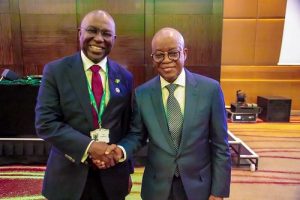Why Terrorists, Kidnappers Demand Ransom in Cryptocurrency, by Ex-CBN Dep Governor

Terrorists and kidnappers constitute major patrons of cryptocurrency because the virtual currency can hardly be traced, the former Deputy Governor of Central Bank of Nigeria (CBN), Prof. Kingsley Moghalu, has said.
Moghalu added that another reason is that the virtual currency is not controlled by governments and central banks.
Speaking at the Cybertech Global 2021 conference on cybersecurity in Dubai recently, he disclosed that sub-Saharan Africa region has become the world’s leader in the use of virtual currency.
Noting that the rise of cryptocurrency has created a lot of awareness of fintech sector risks, he called for measures to address such challenges.
He said that eventhough the Central Bank of Nigeria (CBN) barred cryptocurrency platforms and bank accounts in the country’s banking system, Nigeria remains one of the highest trades in virtual currency, particularly Bitcoin.
According to him, Nigeria comes third behind United States and Russia with over $400 million in trades last year.
Thisday Newspaper quotes Moghalu saying, “Overall, African countries suffer from an under-qualified cybersecurity workforce. The level of investment in cybersecurity in the fintech sector is still relatively low, although it is rising, and African banks are still vulnerable to cyber-attacks.
“There is inadequate protection of ICT infrastructure and relatively weak cybercrime laws. There is a strong need for educational campaigns for fintech users and the private sector, which hosts most fintech networks, needs to work more closely with governments in Africa to prevent and combat cybercrime.
“There is also significant opportunity for peer-to-peer exchange of best practices in cybersecurity between market players in technologically advanced countries and African countries that lead the world in fintech, but not necessarily in fintech security or regulatory technology.
“Over 50 per cent of 282 mobile money services in the world today are operating in Africa. The fintech sector in the continent has exploded over the past two decades, enabling Africa to leapfrog into the digital age as it became the world’s fastest mobile telephone market in the 2000s.
“The continent jumped from severely inadequate landline telephone infrastructure to 750 million mobile phone lines in a continental population of one billion people. Nigeria, for example, had less than 100,000 landlines in 2001, managed by the Nigerian Telecommunications Ltd. (NITEL), an inefficient and corruption-ridden state monopoly.
“Today, 20 years later, the country has 160 million mobile phone lines for its population of 200 million, following the introduction of the Global System for Mobile Communications (GSM) with licences given to private sector companies after the deregulation of the telecommunications sector.”
Among speakers in the Cybertech Global 2021 conference on cybersecurity held in Dubai were the former Director of the Central Intelligence Agency (CIA), General David Petraeus; Director-General of Israel’s National Cyber Directorate, Yigal Unna and the former Supreme Commander of NATO Forces in Europe, General Wesley Clark, according to Thisday report.
Moghalu added that another reason is that the virtual currency is not controlled by governments and central banks.
Speaking at the Cybertech Global 2021 conference on cybersecurity in Dubai recently, he disclosed that sub-Saharan Africa region has become the world’s leader in the use of virtual currency.
Noting that the rise of cryptocurrency has created a lot of awareness of fintech sector risks, he called for measures to address such challenges.
He said that eventhough the Central Bank of Nigeria (CBN) barred cryptocurrency platforms and bank accounts in the country’s banking system, Nigeria remains one of the highest trades in virtual currency, particularly Bitcoin.
According to him, Nigeria comes third behind United States and Russia with over $400 million in trades last year.
Thisday Newspaper quotes Moghalu saying, “Overall, African countries suffer from an under-qualified cybersecurity workforce. The level of investment in cybersecurity in the fintech sector is still relatively low, although it is rising, and African banks are still vulnerable to cyber-attacks.
“There is inadequate protection of ICT infrastructure and relatively weak cybercrime laws. There is a strong need for educational campaigns for fintech users and the private sector, which hosts most fintech networks, needs to work more closely with governments in Africa to prevent and combat cybercrime.
“There is also significant opportunity for peer-to-peer exchange of best practices in cybersecurity between market players in technologically advanced countries and African countries that lead the world in fintech, but not necessarily in fintech security or regulatory technology.
“Over 50 per cent of 282 mobile money services in the world today are operating in Africa. The fintech sector in the continent has exploded over the past two decades, enabling Africa to leapfrog into the digital age as it became the world’s fastest mobile telephone market in the 2000s.
“The continent jumped from severely inadequate landline telephone infrastructure to 750 million mobile phone lines in a continental population of one billion people. Nigeria, for example, had less than 100,000 landlines in 2001, managed by the Nigerian Telecommunications Ltd. (NITEL), an inefficient and corruption-ridden state monopoly.
“Today, 20 years later, the country has 160 million mobile phone lines for its population of 200 million, following the introduction of the Global System for Mobile Communications (GSM) with licences given to private sector companies after the deregulation of the telecommunications sector.”
Among speakers in the Cybertech Global 2021 conference on cybersecurity held in Dubai were the former Director of the Central Intelligence Agency (CIA), General David Petraeus; Director-General of Israel’s National Cyber Directorate, Yigal Unna and the former Supreme Commander of NATO Forces in Europe, General Wesley Clark, according to Thisday report.





